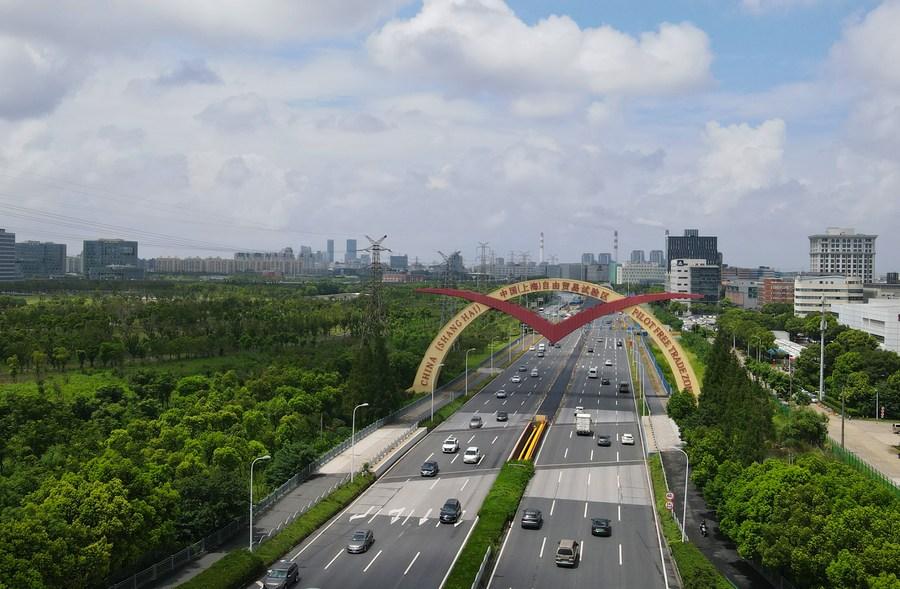Nation may allow higher foreign stakes in certain JVs
 0 Comment(s)
0 Comment(s) Print
Print E-mail China Daily, October 13, 2023
E-mail China Daily, October 13, 2023

This aerial photo taken on Aug. 1, 2023 shows a view of the China (Shanghai) Pilot Free Trade Zone in east China's Shanghai. [Photo/Xinhua]
China is studying the feasibility of further removing or easing the restrictions on the amount of equity stakes that multinational corporations can hold in joint ventures in certain industries, said the Ministry of Commerce on Thursday.
The goal is to attract more global capital, the ministry said.
China, it said, has already eliminated or relaxed foreign equity ownership restrictions in numerous industries.
These include seed production, automobiles, aircraft manufacturing, shipbuilding, securities, banking and insurance, said He Yadong, the ministry's spokesman.
The government, He said, will continue to shorten China's negative lists for foreign investment access in both pilot free trade zones or FTZs and other parts of the country.
A negative list refers to specific areas of industry where foreign investors are not allowed to operate. They can operate in areas not appearing on the list.
Since 2017, negative lists have been revised for five consecutive years. In the 2021 version, the national and FTZ negative lists have been reduced to 31 and 27 items, respectively, according to the ministry.
He said the successful implementation of many projects with foreign investments is a result of China's growing level of openness and related supportive policies. It also reflects the strong appeal of the Chinese market to foreign investors.
For instance, foreign direct investment from Germany surged 21 percent year-on-year in China in the first eight months of this year. In the same period, German companies' investments in China's electrical machinery and equipment manufacturing soared by 172 percent year-on-year, while in chemical production, they spiked by 91 percent, ministry data showed.
The "Invest in China Year" events held by the Chinese government this year have proven effective. Top executives of a large number of German companies, such as BMW Group, SAP SE and Mercedes-Benz AG, have visited China this year, seeking new opportunities to expand their business in the country.
"They hold a positive outlook on China's economic prospects and are willing to increase their investments in the Chinese market," said He.
During his meeting with Chinese Commerce Minister Wang Wentao in Beijing on Monday, US Senate Majority Leader Chuck Schumer said the US side does not seek decoupling from China and is willing to strengthen communication and exchanges with the country.
The Commerce Ministry's He stressed the Chinese government places high emphasis on improving the business environment and will continue to enhance efforts to attract foreign investment.
The ministry will leverage the role of task forces for key foreign investment projects and utilize the mechanism of roundtable meetings with foreign companies effectively, as well as address issues raised by foreign companies, He said.
Upbeat about the Chinese market, Stacey Moser, chief commercial officer of Universal Robots, a Danish industrial robotics company, said the company plans to increase its China investment and bring its latest products to the country for growing its market share.
"China's approach to automation and intelligent manufacturing is marked by a notable emphasis on quality," she said, adding the country is shifting away from low-cost manufacturing to position itself as a quality-oriented country.
Peter Terwiesch, executive committee member and president of the group's process automation business area of ABB Group, a Swiss-Swedish MNC, said China's pilot FTZ policies have not only improved the business environment for MNCs but also strengthened ABB's exports from China.
"A big element is currency exposure, especially where we do longer projects. Currency exposure is sometimes quite significant and, through the FTZs, we could mitigate that," he said.






Go to Forum >>0 Comment(s)